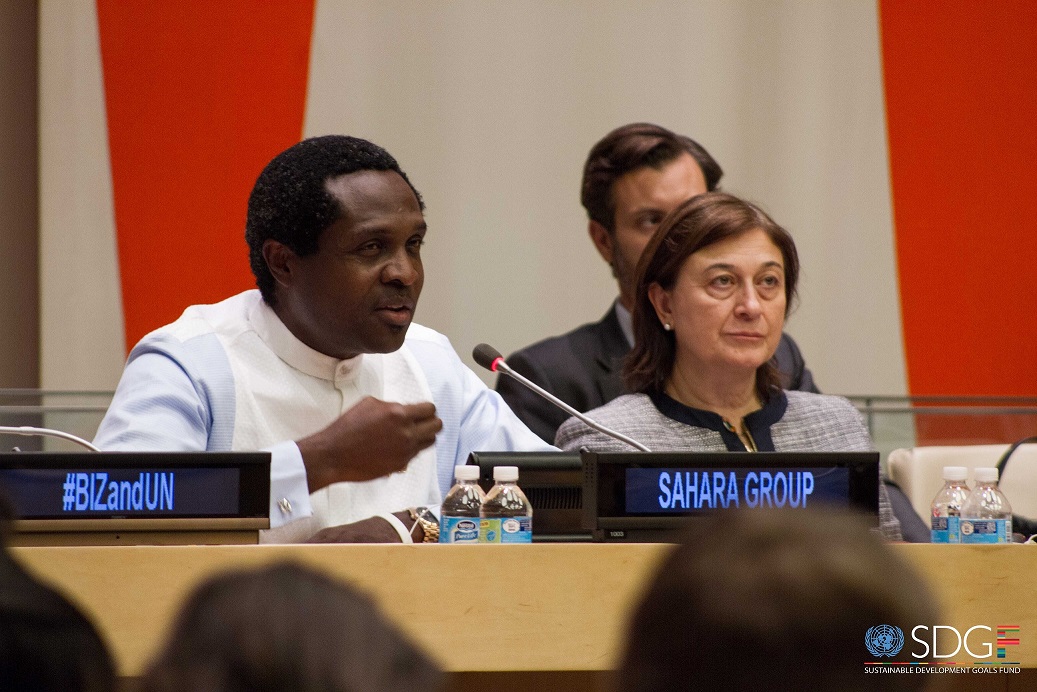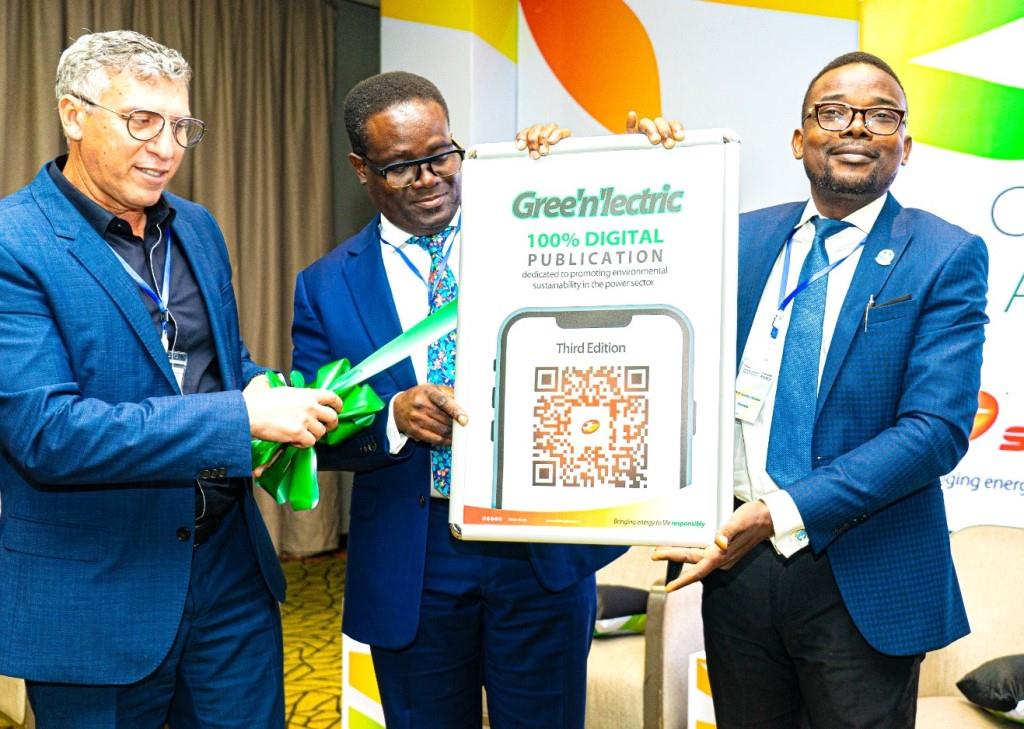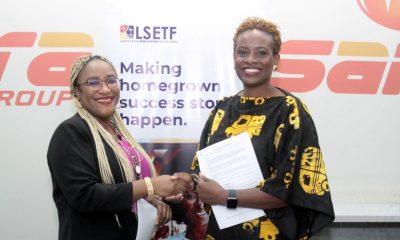Economy
Sahara Group Seeks Global Collaboration on Power

By Dipo Olowookere
Power supply has been described as a subject that requires global collaboration by different stakeholders, given its impact on sustainable development.
This was the submission of the Executive Director and Co-Founder, Sahara Group, Mr Tonye Cole, during a tour of the power operations of the energy conglomerate in Lagos, by 20 Harvard Kennedy School graduates on August 9, 2017.
Mr Cole took his guests, led by Toyosi Akerele-Ogunsiji, the graduates from the 2017 Master in Public Policy Class, to an affiliate of Sahara Group, Egbin Power Plc, where they learned about how continuing investments in technology, human capital, overhauls and upgrades were driving the unfolding transformation the power plant which is responsible for 25 percent of power generated in Nigeria.
An elated Arohi Sharma, the team’s Student Government President 2016-2017 said, “It is quite exciting and amazing to see the remarkable work that is going on at the power plant.
“This is my first time in a facility like this and I am personally looking forward to the emergence of a vibrant power sector in Africa with institutions like Egbin Power playing important roles in this regard.”
Following the nation’s privatization exercise, Sahara, through its power division, Sahara Power Group and sundry affiliations, acquired the 1320MW installed capacity Egbin Power Plant, Ikeja Electric Plc and generation assets at First Independent Power Limited in Rivers State.
In total, Sahara Power Group currently operates power generation facilities with a total of approximately 1,750MW of available capacity and working towards deploying a minimum of 5,000MW of electricity generation over the next five years.
Mr Cole informed the delegates that the privatization of the sector was a critical step Nigeria had to take in its pursuit for a reliable and sustainable power sector.
“What we now need are policies that will drive and sustain productivity across the value chain of generation, transmission and distribution. We have been pioneering advocacy efforts to this end and given the commitment of the current administration through the Minister of Power, Mr Babatunde Fashola as well as the collaboration of all stakeholders in the sector; we believe that we can look forward to a brighter future for the power sector.”
Mr Cole further explained that adopting the right policies would encourage continuing and new investments; address the need for cost reflective pricing of electricity; improve customer experience; promote alternative energy and off-grid solutions and ultimately, position the sector for enhanced efficiency.
He said sundry smart power solutions can be explored and deployed to serve rural communities and boost power generation and supply across Africa.
“At Sahara, we believe that the world needs a cohesive platform to address power challenges as across the globe in order promote peace, economic growth and development.
“In Africa where the need is quite dire, I believe we can deliver power to more people and businesses with collaborative interventions led by the private sector, power firms, multilateral institutions and the governments that determine policy,” he added.
Speaking on ongoing efforts to diversify the economy, Mr Cole said the bedrock of sustainable growth can only be achieved through multiple streams of income.
He urged the delegates to pursue the adoption of destination specific research activities that will throw up appropriate business models that will thrive across diverse markets.
“With a better understanding of the interesting and peculiar business environment that exists within Africa, we will generate business models that can attract more direct foreign investments.
“Nigeria, one of the continent’s leading nations, is a universal boot camp for any business idea. If it succeeds in Nigeria, it can succeed anywhere,” he said.
Akerele-Ogunsiji said the trip to Lagos was part of team’s Inaugural Public Sector Leadership & Innovation Field Visit aimed at enabling the delegates learn more about Lagos State’s polies, competitiveness and Smart City Plan.
Economy
Nigeria’s Economy Expands 4.07% in Q4 2025

By Adedapo Adesanya
Nigeria’s economy, measured by gross domestic product (GDP), grew by 4.07 per cent (year-on-year) in real terms in the fourth quarter (Q4) of 2025.
The National Bureau of Statistics (NBS) announced the development in its latest GDP report for Q4 2025 on Friday.
The latest figure represents an improvement over the 3.76 per cent growth recorded in the corresponding period of 2024, signalling sustained recovery across key sectors of the economy. The growth rate was faster than the third quarter’s 3.98 per cent.
The report confirmed that Nigeria’s oil sector grew 6.79 per cent year-on-year and the non-oil part of the economy expanded by 3.99 per cent.
Nigeria’s average daily oil production stood at 1.58 million barrels per day in the final three months of 2025. That was lower than the third quarter’s output of 1.64 million barrels per day but higher than the 1.54 million barrels per day in the fourth quarter of 2024.
Breakdown of the data showed that the agriculture sector grew by 4.00 per cent in the fourth quarter of 2025. This marks a significant increase compared to the 2.54 per cent growth recorded in the same quarter of 2024, reflecting improved output and resilience in the sector.
The industry sector also recorded a stronger performance during the period under review. It grew by 3.88 per cent year-on-year, up from 2.49 per cent posted in the fourth quarter of 2024. The improvement suggests enhanced activity in manufacturing, construction, and related industrial sub-sectors.
The services sector maintained its position as a major growth driver, expanding by 4.15 per cent in Q4 2025. However, this was slightly lower than the 4.75 per cent growth recorded in the corresponding quarter of the previous year.
Overall, the 4.07 per cent GDP growth in the final quarter of 2025 underscores broad-based expansion across agriculture, industry, and services, despite a marginal moderation in services growth.
The Q4 performance provides further evidence of strengthening economic momentum, with improvements recorded in both agriculture and industry compared to the previous year.
Economy
Flour Mills Supports 2026 Paris International Agricultural Show

By Modupe Gbadeyanka
For the second time, Flour Mills of Nigeria Plc is sponsoring the Paris International Agricultural Show (PIAS) as part of its strategies to fortify its ties with France.
The 2026 PIAS kicked off on February 21 and will end on March 1, with about 607,503 visitors, nearly 4,000 animals, and over 1,000 exhibitors in attendance last year, and this year’s programme has already shown signs of being bigger and better.
The theme for this year’s event is Generations Solution. It is to foster knowledge transfer from younger generations and structure processes through which knowledge can be harnessed to drive technological advancement within the global agricultural sector.
In his address on the inaugural day of the Nigerian Pavilion on February 23, the Managing Director for FMN Agro and Director of Strategic Engagement/Stakeholder Relations, Mr Sadiq Usman, said, “At FMN, our mission is Feeding and Enriching Lives Every Day.
“This is a mandate we have fulfilled through decades of economic shifts, rooted in a culture of deep resilience and constant innovation. We support this pavilion because FMN recognises that the next frontier of global Agribusiness lies in high-level technical exchange.
“We thank the France-Nigeria Business Council (FNBC), the organisers of the PIAS, and our fellow members of the Nigerian Pavilion – Dangote, BUA, Zenith, Access, and our partners at Creativo El Matador and Soilless Farm Lab— we are exceedingly pleased to work to showcase the true face of Nigerian commerce.”
Speaking on the invaluable nature of the relationship between Nigeria and France, and the FMN’s commitment to process and product innovation, Mr John G. Coumantaros, stated, “The France – Nigeria relationship is a valuable partnership built on a shared value agenda that fosters remarkable Intercontinental trade growth.
“Also, as an organisation with over six decades of transformational footprint in Nigeria and progressively across the African Continent, FMN has been unwaveringly committed to product and process innovation.
“Therefore, our continuous partnership with France for the success of the Paris International Agricultural Show further buttresses the thriving relationship between both countries.”
PIAS is one of the most widely attended agricultural shows, with thousands of people from across the world in attendance.
Economy
NEITI Backs Tinubu’s Executive Order 9 on Oil Revenue Remittances

By Adedapo Adesanya
Despite reservations from some quarters, the Nigeria Extractive Industries Transparency Initiative (NEITI) has praised President Bola Tinubu’s Executive Order 9, which mandates direct remittances of all government revenues from tax oil, profit oil, profit gas, and royalty oil under Production Sharing Contracts, profit sharing, and risk service contracts straight to the Federation Account.
Issued on February 13, 2026, the order aims to safeguard oil and gas revenues, curb wasteful spending, and eliminate leakages by requiring operators to pay all entitlements directly into the federation account.
NEITI executive secretary, Musa Sarkin Adar, called it “a bold step in ongoing fiscal reforms to improve financial transparency, strengthen accountability, and mobilise resources for citizens’ development,” noting that the directive aligns with Section 162 of Nigeria’s Constitution.
He noted that for 20 years, NEITI has pushed for all government revenues to flow into the Federation Account transparently, calling the move a win.
For instance, in its 2017 report titled Unremitted Funds, Economic Recovery and Oil Sector Reform, NEITI revealed that over $20 billion in due remittances had not reached the government, fueling fiscal woes and prompting high-level reforms.
Mr Adar described the order as a key milestone in Nigeria’s EITI implementation and urged amendments to align it with these reforms.
He affirmed NEITI’s role in the Petroleum Industry Act (PIA) and pledged close collaboration with stakeholders, anti-corruption bodies, and partners to sustain transparent management of Nigeria’s mineral resources.
Meanwhile, others like the Petroleum and Natural Gas Senior Staff Association of Nigeria (PENGASSAN) have kicked against the order, saying it poses a serious threat to the stability of the oil and gas industry, calling it a “direct attack” on the PIA.
Speaking at the union’s National Executive Council (NEC) meeting in Abuja on Tuesday, PENGASSAN President, Mr Festus Osifo, said provisions of the order, particularly the directive to remit 30 per cent of profit oil from Production Sharing Contracts (PSCs) directly to the Federation Account, could destabilise operations at the Nigerian National Petroleum Company (NNPC) Limited.
Mr Osifo firmly dispelled rumours of imminent protests by the union, despite widespread claims that the controversial executive order threatens the livelihoods of 10,000 senior staff workers at NNPC.
He noted, however, that the union had begun engagements with government officials, including the Presidential Implementation Committee, and expressed optimism that common ground would be reached.
Mr Osifo, who also serves as President of the Trade Union Congress (TUC), expressed concerns that diverting the 30 per cent profit oil allocation to the Federation Account Allocation Committee (FAAC), without clearly defining how the statutory management fee would be refunded to NNPC, could affect the salaries of hundreds of PENGASSAN members.
-

 Feature/OPED6 years ago
Feature/OPED6 years agoDavos was Different this year
-
Travel/Tourism10 years ago
Lagos Seals Western Lodge Hotel In Ikorodu
-

 Showbiz3 years ago
Showbiz3 years agoEstranged Lover Releases Videos of Empress Njamah Bathing
-

 Banking8 years ago
Banking8 years agoSort Codes of GTBank Branches in Nigeria
-

 Economy3 years ago
Economy3 years agoSubsidy Removal: CNG at N130 Per Litre Cheaper Than Petrol—IPMAN
-

 Banking3 years ago
Banking3 years agoSort Codes of UBA Branches in Nigeria
-

 Banking3 years ago
Banking3 years agoFirst Bank Announces Planned Downtime
-

 Sports3 years ago
Sports3 years agoHighest Paid Nigerian Footballer – How Much Do Nigerian Footballers Earn




















